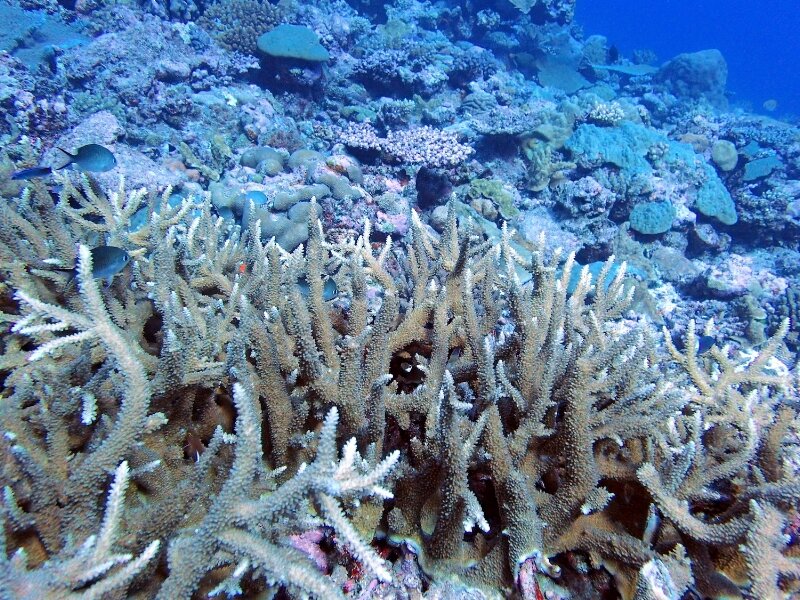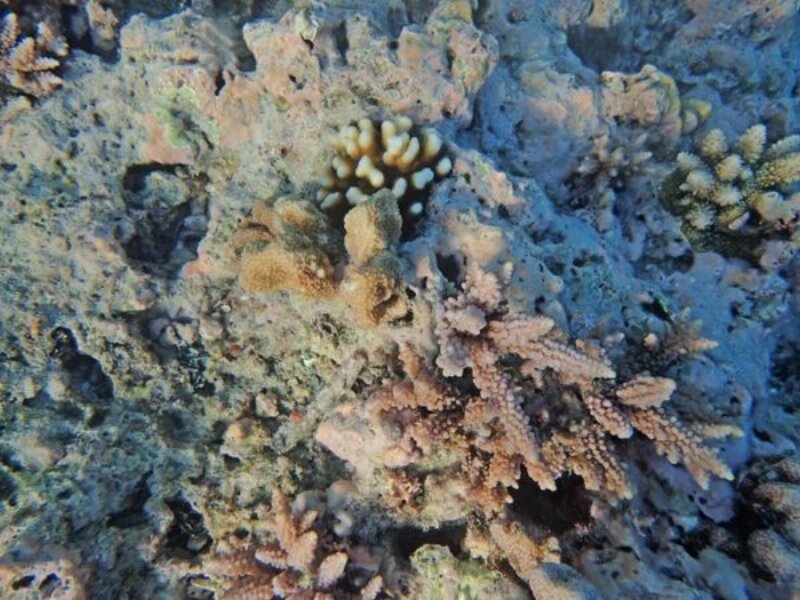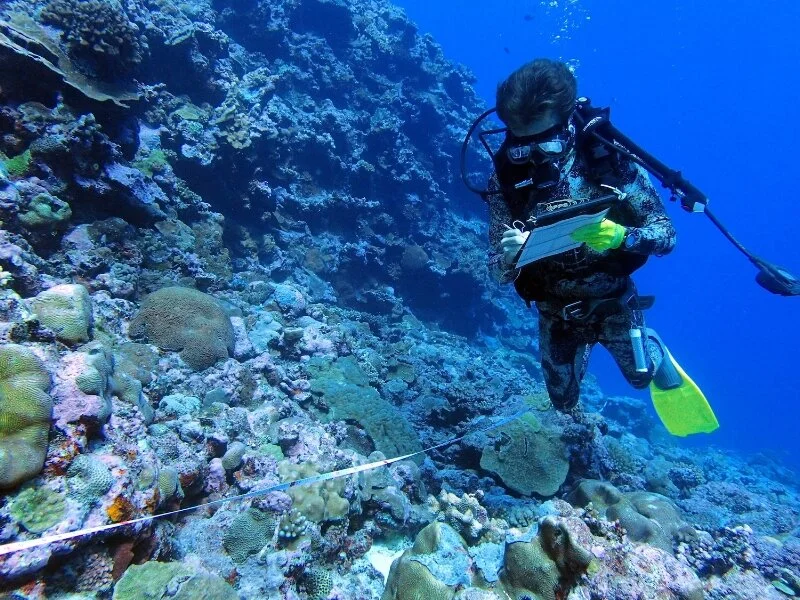Resilient coral reefs in the Northern Lau Group
A team of Fijian scientists from the Vatuvara Foundation and Wildlife Conservation Society (WCS) partnered together and embarked last year on an expedition to survey coral reefs in the remote islands of Fiji’s Northern Lau Group. The marine survey report has just come out detailing the results from this research initiative, and will be used to support efforts to preserve coral reef ecosystems and safeguard these unique waters.
Flying over survey sites at Kaibu and Yacata islands ©Katy Miller/Vatuvara Foundation
The Lau Group has been identified as an area of national significance and high priority for marine protection. Over the last decade, only four marine surveys in the Lau group have been conducted. In 2016, Fiji was hit by Category 5 Tropical Cyclone Winston with wind speeds of 233km/hour and gusts of 306km/hour. It was the largest cyclone in the Southern Hemisphere, causing widespread damage across the country. Cyclone Winston made first landfall over the group of islands surveyed in Northern Lau, severely damaging the islands and coral reef systems. However, at the time no studies were done to assess the impact on coral reefs and fisheries.
Fifteen months later in May 2017, an 8-day marine biological baseline survey was conducted by Vatuvara Foundation and WCS around five islands in the Northern Lau Group. This marine survey represented the first comprehensive assessment of coral reefs around the islands of Kaibu, Yacata, Vatuvara, Kanacea and Adavaci. The objectives of the survey were to collect data on the health, abundance and diversity of corals, reef fish and invertebrate species; establish a baseline for long-term monitoring; document the damage to community fishing grounds caused by Cyclone Winston; and provide recommendations to communities on the management of their traditional fishing grounds to support food security and sustainable livelihoods. Live blogs were done from the field and featured on National Geographic , WCS and Vatuvara Foundation websites.
Thickets of Acropora are used as shelter or home by small chromis. This dive site showed a good example of healthy hard coral cover. ©Sangeeta Mangubhai/WCS.
The team found that the islands and lagoons surveyed were healthy, represented a diverse assemblage of hard corals, and were good examples of remote habitats that have not been exposed to intense human pressure. The coral reefs habitats were largely steep outer walls of spectacular reef and azure shallow inner lagoons containing sand and seagrass flats, interspersed with patch reefs. The coasts of the islands were lined with dense seagrass beds, which are critical habitats for fish and invertebrate species, and are feeding grounds for the green and hawksbill turtles sited during multiple dives. The reefs hosted diverse coral communities with 47 coral genera recorded across the five islands. There were abundant of submassive, massive and tabulate forms of Porites; branching, staghorn corymbose, plating forms of Acropora; and branching Pocillopora species. Despite the damages caused by Cyclone Winston evident at 18 of the 33 sites surveyed, the team identified the presence of juvenile coral recruits, which indicated early signs of recovery. The high percentage of hard coral cover when combined with careful management suggested the reefs were resilient and that the impacted areas could potentially regenerate by 2021, if well looked after.
Juvenile corals surrounded by crustose coralline algae. ©Katy Miller/Vatuvara Foundation
The surveys documented healthy fish populations, especially herbivores such as surgeonfish, unicornfish, and parrotfish. The average fish biomass across all sites was remarkably high, with Vatuvara Island supporting the highest biomass. Global studies have shown it is important to maintain fish biomass above 1000 kg per hectare of reef to maintain healthy fish populations. The islands supported a number of globally threatened species, including the globally endangered humphead wrasse (Cheilinus undulatus), four shark species and the endangered green turtle (Chelonia mydas) and hawksbill turtle (Eretmochelys imbricata).
Sadly, all islands had very low abundance of important invertebrates such as, sea cucumber and giant clams. Sea cucumbers and giant clams are vital to coastal ecosystems, but have been subject to large-scale removal over several decades in Fiji. Without further action, these species disappear and may become locally extinct.
Tridacna squamosa found in coral reef at Kaibu Island. ©Katy Miller/Vatuvara Foundation
Based on these findings, the team recommended the following actions to protect these coral reefs for the communities and ecosystems that depend upon them.
Actions should be taken to minimize human stresses to coral reefs, especially areas that were impacted by Cyclone Winston.
Protection of coral reefs that were undamaged, which may play a critical role in the recovery of adjacent impacted reefs.
Recommendations to communities of key areas for conservation, including sites for inclusion in proposed networks of Locally-Marine Managed Areas (LMMAs) or Marine Protected Areas (MPAs) should be provided. Planning should be done in consultation with communities, respecting the traditional values, needs and aspirations of communities.
Establish MPAs that are easily enforceable and targeting areas that are diverse, unique and provide refuge for threatened species.
Livelihood programs for communities should be developed in order to relieve pressures from marine resources and support sustainable futures.
A surveillance and enforcement strategy should be implemented to reduce threats to coral reefs.
A monitoring program to measure the recovery of coral reefs should be implemented over the next 2−5 years, and ensure it is linked to management actions.
Steven Lee documenting benthic cover found at survey dive site. ©Sangeeta Mangubhai/WCS
This year is the International Year of the Reef, dedicated to strengthening awareness on the critical role coral reef ecosystems in the health of our planet. Healthy coral reefs provide spawning, nursery, refuge and feeding areas to a diversity of marine life, and are an important source of livelihood for local communities. The baseline information collected during this survey has provided a biological benchmark useful to understand environmental changes and recovery rates for reef systems in the Lau Group.
The “Marine Biological Surveys of the Northern Lau Group” report with details of survey findings is available online, and can be downloaded from www.vatuvara.org and https://fiji.wcs.org/Resources/Reports.aspx





